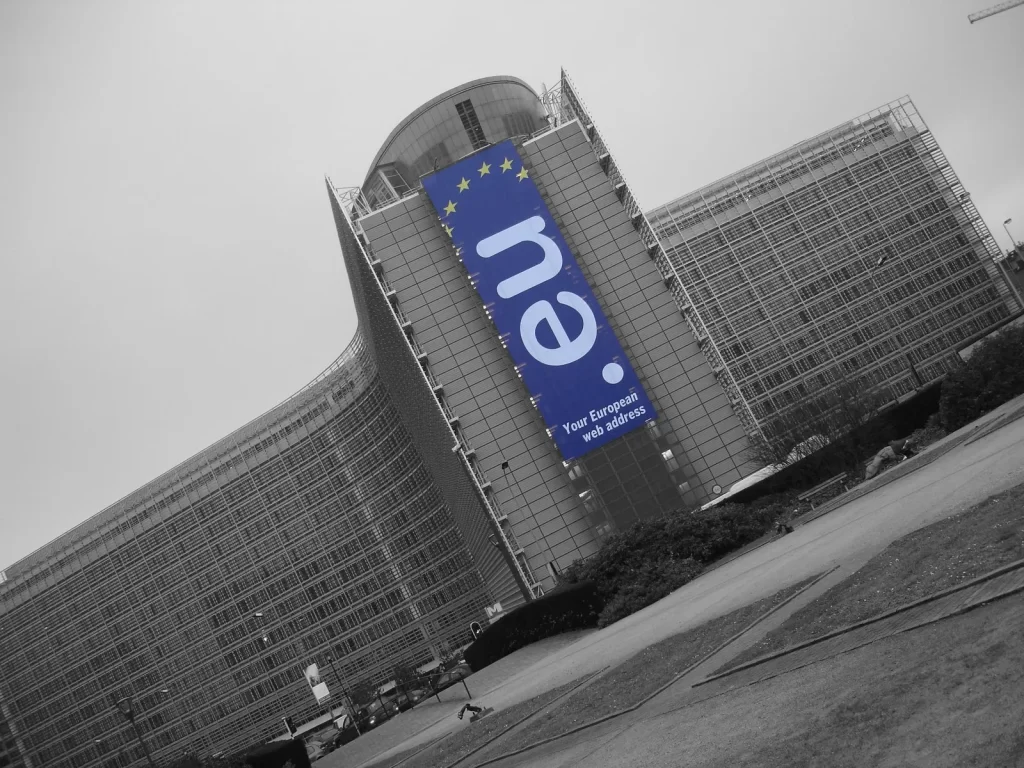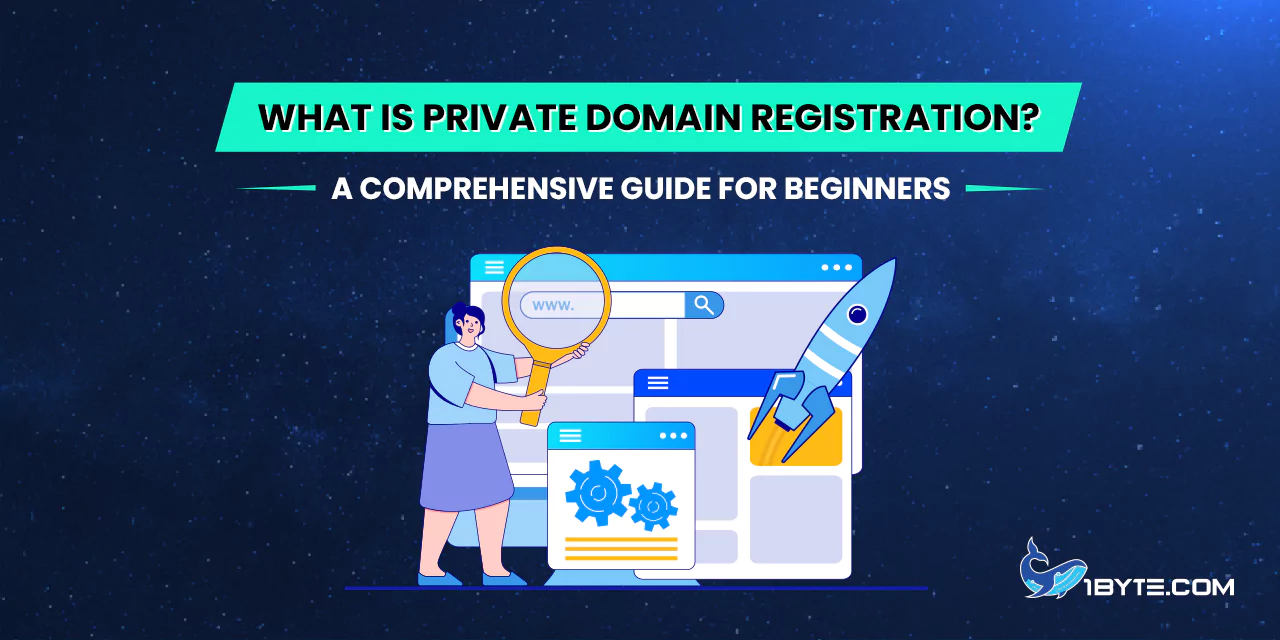Welcome to the complete beginner’s guide to “What is Private Domain Registration?” from 1Byte! In today’s world of the internet, privacy is a luxury. One area where this is particularly true is domain registration.
Now, what is private domain registration? It is a service that enables people to register their domain names without disclosing their personal or business contact details to the public through the WHOIS database. This extra level of privacy has become quite popular with site owners who wish to keep their personal details private.
Domain privacy or private domain registration hides your information and uses the details of your registrar. This means that the ownership of the domain is concealed and your privacy is preserved but this is done within the framework of ICANN regulations.
For instance, if you register a domain name like domainwheel. here at com, your personal information (for instance, your name, address, email, phone number, etc. ) is not disclosed to the public. Instead, the details of your domain registrar or hosting company will be shown.
This guide will explore the advantages and disadvantages of private domain registration, describe what the WHOIS database is and how it has evolved. We will also include links to the reports and concrete examples to support some of the data and information presented in the paper.
What is Private Domain Registration?
Diving into the world of domain names, one question often arises: “What is private domain registration?” This concept, though simple, plays a crucial role in protecting your online identity.
FURTHER READING: |
| 1. What is .cam Domain? Everything You Need to Know |
| 2. Ecommerce Domain: How to Choose the Perfect Domain for Your Online Store |
| 3. Addon Domain Explained: A Comprehensive Guide |
Definition and explanation of private domain registration
Private domain registration is another term used for domain privacy and it entails hiding your contact details from the public. When registering a domain name, you are asked to input personal and/or business details. This includes your name, your address and your contact information. Usually, this information can be obtained from the WHOIS database which is a public service.
But with private domain registration, your domain registrar will hide your information with theirs. This means that your ownership of the domain becomes unknown to the public. Your privacy is assured at the same time as following the ICANN guidelines. This service provides an additional level of privacy which may help to avoid harassment and other security issues.

The WHOIS database is a publicly accessible directory that contains the information about the domain names and their IP addresses. It is very important in the provision of the accountability of the ownership of the domain name. It is employed for several purposes such as confirming the ownership of a website and for domain transfer and purchase.
Private domain registration is a paid service that hides your details in the WHOIS database and does not allow it to be publicly available. Some domain registrars include this as a standard feature while others will sell it as an add on service. You decide who gets to contact you and at what time you will be willing to receive such contact. There are some TLDs that do not permit the addition of Private Registration.
The role of ICANN in domain name registration
To comprehend the meaning of “what is private domain registration”, one must first understand the function of the Internet Corporation for Assigned Names and Numbers (ICANN) in the registration of domain names.
ICANN, established in 1998, is a non-profit public benefit organization that regulates all the registries, registrars and IP addresses. It guarantees stability and security, as well as a unified global Internet for all of us. With ICANN, getting a domain name is much easier and there is some level of protection for your domain and your information.
ICANN’s main functions include the regulation of the DNS, which is a database of all the domain names that exist. This system is like a middle man between the domain name and the IP address that the computer understands. DNS management entails the certification of domain registrars and registries.
It also has the responsibility of coordinating the expansion of new generic Top-Level Domains (gTLDs) and country-code Top-Level Domains (ccTLDs). Also, it offers accreditation to registrars who are responsible for the management of the reservation of domain names. The registrars are still held to be answerable for all the domain names sold by their sub-sellers.
When it comes to private domain registration, ICANN is of great significance. When registering a domain name, ICANN demands the owner’s personal and/or business information to be provided. These are your name, your address, your name servers, and your contact information. These are in turn listed in the IANA WHOIS database. This enables anyone to find out who the domain is registered to and how they can be reached.
Private registration is a service domain providers provide to hide your contact details from the users. In private registration, the provider will substitute your information with his or her own. This means that the ownership of the domain is concealed and your privacy is preserved but at the same time you are in compliance with ICANN.
The WHOIS Database
Diving into the world of domain registration, one term you’ll frequently encounter is the “WHOIS Database”. This database is a critical component of the internet’s domain name system, acting as a public ledger for domain name registrations.
Explanation of the WHOIS database and its purpose
The WHOIS database is a public record containing information about domain names that have been registered. It holds the data obtained during the domain name registration or modification of DNS settings. This database is controlled by ICANN which is the International Corporation for Assigned Names and Numbers.
WHOIS database was initially developed as a directory. It contained the details of anyone who was communicating over the ARPANET, which forms part of the modern Internet. Due to the availability of the Internet, the function of the WHOIS database has changed. It now assists in the preservation of the accountability of the ownership of the domain name.

The WHOIS database makes the Internet accessible to everyone. It enables anyone including business organizations, corporations, police, and even an individual to discover the owner of a domain name and any website linked to it. This is especially so in the current generation where people are being provided with fake news and it is essential to know the source of the news.
The WHOIS database is also useful in business since it contains information about domains. For instance, if you are planning to develop a new business and want to create a website for it, you may come across the situation where the domain name you want has already been taken by another party. You can use the WHOIS database to get their contact information and contact them to try and negotiate for the domain name you want.
How private registration interacts with the WHOIS database
When you inquire, “What is private domain registration?” you are actually entering the sphere of privacy. This service is also known as domain privacy and it is an important factor of owning a domain. It works with the WHOIS database in a special manner and thus offers an extra level of protection for the owners of domains.
The Internet Corporation for Assigned Names and Numbers (ICANN) is the organization that regulates the management of domain name system. In this regard, ICANN has the policy of making the domain owners provide their or their business contact information. This information is then stored in the WHOIS database which is a directory where information about domain names is stored.
However, this is where private registration steps in. Instead of showing your information in the WHOIS database, private registration shows the information of the domain registrar or the hosting company. This is done by acquiring the WHOIS Privacy protection along with the domain. Some of the companies have this feature as a standard feature while others may need the client to purchase it as a separate package.
Okay, what does this mean for you? In essence, private registration hides your identity as the owner of the domain. Your contact information is hidden and substituted with your provider’s information; however, it does not violate the ICANN rules. This helps in avoiding contact with people one may not wish to meet and also helps in avoiding security threats.
However, not all domain types can be protected by this privacy service, so it is crucial to consider this factor. Certain domain extensions, for instance, .US, do not allow a registrant to use a proxy. Hence, it is crucial to determine the eligibility of the domain extension before going for private registration.
Benefits and Drawbacks of Private Domain Registration
As we delve into the world of domain registration, a question often arises: “What is private domain registration?”. This service, also known as domain privacy, is a popular choice among site owners who wish to protect their personal information. However, like any service, it comes with its own set of benefits and drawbacks.

The pros of private domain registration
If you are wondering what private domain registration is, then it is crucial to know the advantages of this service. Here are some of the key advantages:
- Enhanced Privacy: Private domain registration helps to hide your and your business contacts’ information from the general public. This implies that your name, address and any other information that may be associated with the domain name will not be displayed in the WHOIS database.
- Reduced Spam: You will not be able to receive spam emails and calls since your contact information is concealed. This can assist you in keeping your inbox less cluttered and your phone line with fewer interruptions.
- Increased Security: Private registration provides an additional protection against possible dangers. It becomes difficult for the hackers to plan a phishing attack, social engineering attack or any other cybercrime on you.
- Protection Against Unsolicited Marketing Outreach: The WHOIS database is commonly employed by marketers to collect contact details. Choosing private registration, you do not provide your information to them and thus protect yourself.
- Maintains Accessibility: Still, anyone who has a legitimate reason to get in touch with you can do so by contacting the privacy service you have used.
- Protects Your Business: Private registration can help to hide your employees’ names and contact information, which is rather sensitive data. This is especially useful for small business people who may not wish their home addresses to be known to the public.
Therefore, private domain registration is a service that can be quite useful and provide you with numerous advantages. From enhanced privacy to the minimization of spam, it is a service that may be of interest when one is asking, “What is private domain registration?”.
The cons of private domain registration
Despite the many advantages, it is equally crucial to know the disadvantages of private domain registration while explaining “what is private domain registration”. Here are some key points to consider
- Cost: Private registration is usually more costly than the normal one as it has an extra charge. This extra cost may be a put off for some people especially the small businesses or individuals who may be operating on a tight budget.
- Reduced Transparency: Private domain registration is not very helpful for the openness of information. It hides the registrant’s data from public access, which complicates the process of checking the ownership of the domain or contacting the domain owner for legitimate reasons.
- Ownership Issues: In private registration, the domain name owner is the registrar and this is reflected in the WHOIS database. This could cause some problems since ICANN considers the entity listed in the WHOIS database as the domain owner. This is not very common but it is something that can happen and that is why it is important to know about it.
- Inadequate Protection: Some of the private registration services do not provide adequate protection or forwarding services. This could expose your domain to some risks.
- Cybersecurity Risks: However, the privacy that comes with private domain registration does not mean that you are safe from hackers. In fact, 60% of small companies go out of business within six months of a cyber attack.
In conclusion, although private domain registration can be beneficial in some aspects, one should consider the mentioned disadvantages as well. In simple terms, it is all about trying to understand what ‘private domain registration’ means in terms of privacy, cost, and openness.
Leverage 1Byte’s strong cloud computing expertise to boost your business in a big way
1Byte provides complete domain registration services that include dedicated support staff, educated customer care, reasonable costs, as well as a domain price search tool.
Elevate your online security with 1Byte's SSL Service. Unparalleled protection, seamless integration, and peace of mind for your digital journey.
No matter the cloud server package you pick, you can rely on 1Byte for dependability, privacy, security, and a stress-free experience that is essential for successful businesses.
Choosing us as your shared hosting provider allows you to get excellent value for your money while enjoying the same level of quality and functionality as more expensive options.
Through highly flexible programs, 1Byte's cutting-edge cloud hosting gives great solutions to small and medium-sized businesses faster, more securely, and at reduced costs.
Stay ahead of the competition with 1Byte's innovative WordPress hosting services. Our feature-rich plans and unmatched reliability ensure your website stands out and delivers an unforgettable user experience.
As an official AWS Partner, one of our primary responsibilities is to assist businesses in modernizing their operations and make the most of their journeys to the cloud with AWS.
Conclusion
In conclusion, it is imperative to know about private domain registration if one wants to create a website. It offers a form of protection and confidentiality in that it hides information from the general public.
Here are some key takeaways:
- The number of domain name registrations across the globe has now gone beyond 362.4 million, out of which a large number of people chose private registration.
- Private domain registration hides one’s contact details on the WHOIS database.
- It is widely used by people and companies that prefer to keep their information private.
But it is not a universal remedy for all the problems. Some may opt for public domain registration because of the openness and the ability to communicate directly with the public. Hence, it is crucial to consider the advantages and disadvantages of the decision in question.
To find out more, please visit the latest Domain Name Industry Brief Quarterly Report and other useful materials. Therefore, it is important to note that the decision between public and private domain registration is relative to the particular situation.

